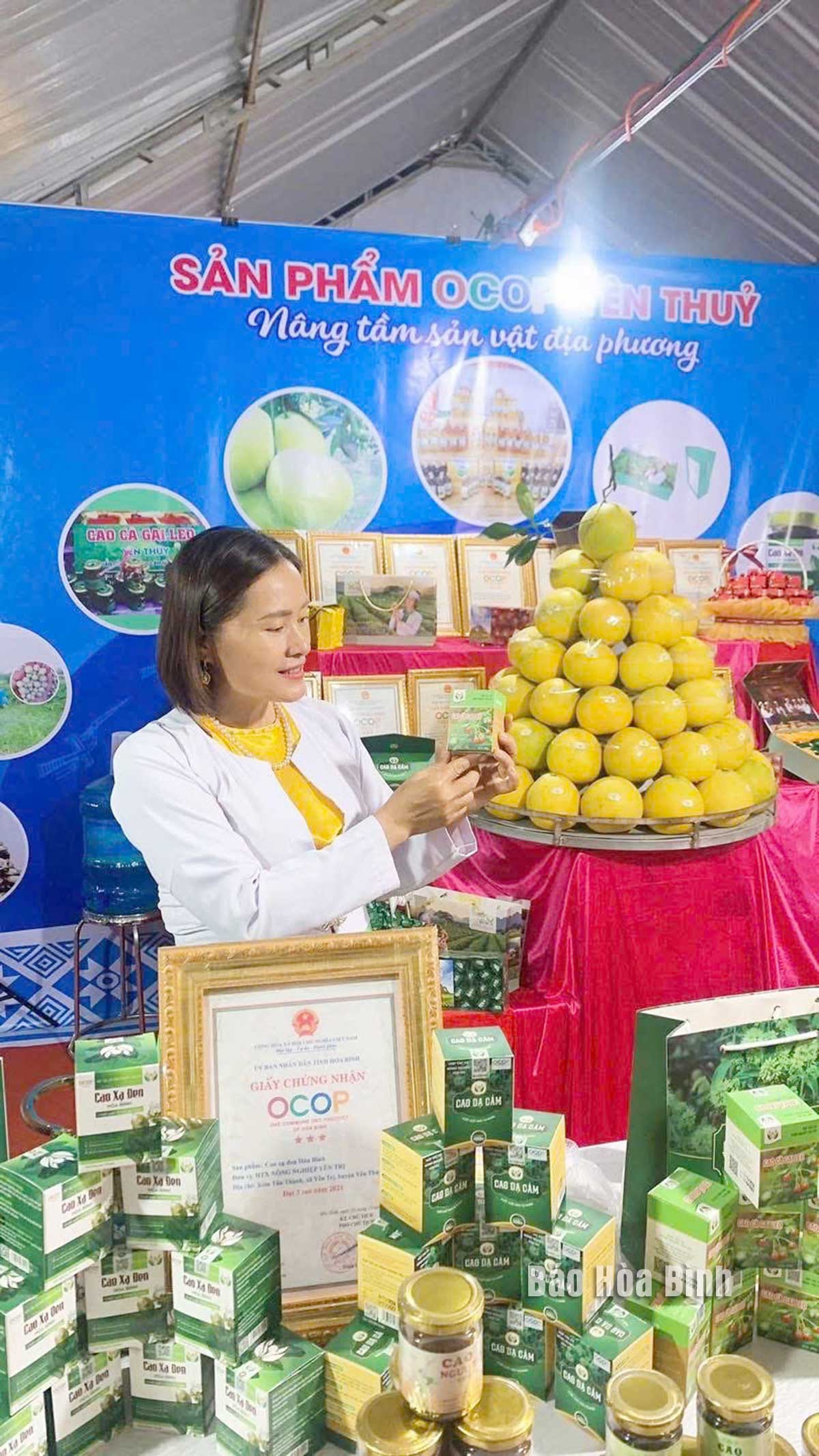
Maximizing local potential and advantages, Yen Tri commune in Yen Thuy district is actively promoting the cultivation of medicinal herbs and turning medicinal herbs into One Commune - One Product (OCOP) products.

OCOP products by Yen Tri Agricultural
Cooperative are promoted at the 2nd Da River Fish and Shrimp Festival held in
November 2024.
Chairman of the Yen Tri Commune People's
Committee Bui Phi Diep said that the economic value of medicinal plants is
tenfold higher than traditional crops like potatoes and cassava. So, local
farmers have prioritised the cultivation and expansion of medicinal herbs in
recent years.
Currently, approximately 15 ha of previously
unproductive land have been converted for medicinal herb cultivation, involving
over 140 households. This includes 6 ha of black licorice, 1 ha of "da cam” (Herba
Hedyotis capitellata), and 8 ha of other herbs. The annual yields reach over
450 tonnes, equivalent to 121 tonnes of finished products.
In addition to favourable climate and soil
conditions, Yen Tri has a strong network of traditional herbalists, numbering
around 50, including a nationally recognised herbalist. These practitioners
preserve and promote many traditional remedies, particularly for liver, joint,
kidney, and digestive ailments. The long-standing experience of Yen Tri
residents in cultivating and caring for medicinal plants creates favourable
conditions for sustainable development of both raw material zones and OCOP
herbal products.
The commune currently boasts two 3-star OCOP
herbal products - black licorice and "da cam” extract, produced by the Yen Tri
Agricultural Cooperative. Utilising modern extraction technology to preserve
medicinal properties, these OCOP products have earned the trust and high regard
of consumers both locally and beyond.
Despite these achievements, the sustainable development
of medicinal plants and OCOP products in Yen Tri faces challenges, including
unstable product markets and a lack of robust supply chains. Additionally,
post-harvest processing technology remains limited and unsynchronised.
Recently, the Hoa Binh provincial People’s
Committee has approved a project on piloting the development of OCOP herbal
products linked to local raw material zones in Yen Tri commune, creating
opportunities for sustainable growth for the locality.
The project outlines solutions to address
existing issues, including enhancing infrastructure, irrigation systems,
workforce training, modern technology transfer, and promoting trade and product
marketing. Strengthening partnerships with businesses to ensure stable product
outputs is also a priority.
The project also pointed out the need to explore
new product lines from medicinal plants, such as instant powders, tea bags,
herbal cakes, and herbal beverages.
The project is expected to support the expansion
of 36 ha of raw material zones with crops like black licorice, "da cam”,
"che vang" (Jasminum subtriplinerve), Jiaogulan, and 25 ha of buffer
zones for growing "ca gai leo” (Solanum trilobatum) in the neighbouring
communes of Da Phuc and Lac Luong.
This project will open promising prospects for
developing OCOP herbal products in Yen Tri, ensuring sustainable growth and
contributing to improving the living standards of the local people while
promoting its socio-economic development.
According to data from the Hoa Binh Provincial Party Committee, the industrial production index for the first six months of 2025 is estimated to have increased by 20% compared to the same period last year. This marks the highest year-on-year growth rate for this period since 2020.
In the first six months of 2025, Hoa Binh province’s export turnover was estimated at 1.145 billion USD, marking an 18.11% increase compared to the same period in 2024. Import turnover was estimated at $ 804 million, a 17.15% increase, which helped the province maintain a positive trade balance.
The lives of the ethnic minority farmers in Tan Lac district have gradually improved thanks to the new directions in agricultural production. This is a testament to the collective strength fostered through the professional associations and groups implemented by various levels of the district’s Farmers’ Union.
With the motto the "product quality comes first,” after nearly one year of establishment and operation, Muong village’s Clean Food Agricultural and Commercial Cooperative, located in Cau Hamlet, Hung Son Commune (Kim Boi district), has launched reputable, high-quality agricultural products to the market that are well-received by consumers. The products such as Muong village’s pork sausage, salt-cured chicken, and salt-cured pork hocks have gradually carved out a place in the market and they are on the path to obtaining the OCOP certification.
In the past, the phrase "bumper harvest, rock-bottom prices" was a familiar refrain for Vietnamese farmers engaged in fragmented, small-scale agriculture. But today, a new spirit is emerging across rural areas of Hoa Binh province - one of collaboration, organisation, and collective economic models that provide a stable foundation for production.
Maintaining growing area codes and packing facility codes in accordance with regulations is a mandatory requirement for agricultural products to be eligible for export. Recently, the Department of Agriculture and Environment of Hoa Binh province has intensified technical supervision of designated farming areas and packing facilities to safeguard the "green passport" that enables its products to access international markets.



